|
|
|
Sort Order |
|
|
|
Items / Page
|
|
|
|
|
|
|
| Srl | Item |
| 1 |
ID:
119863
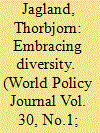

|
|
|
|
|
| Publication |
2013.
|
| Summary/Abstract |
Strasbourg, France-Any attempt to explain a transnational identity must take into account that nations, cultures, and people have always met and mixed across borders and boundaries. Europe's historically grounded diversity constitutes our true identity and gives us great strength if properly understood and respected. Over the centuries, nations have been born, and borders created or modified. The most recent wave of border changes occurred after the fall of communism. While some changes proved violent, such as war in the Balkans after the disintegration of Yugoslavia, others were peaceful. Czechoslovakia split, without conflict, into the Czech Republic and Slovakia.
|
|
|
|
|
|
|
|
|
|
|
|
|
|
|
|
| 2 |
ID:
182670
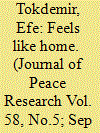

|
|
|
|
|
| Summary/Abstract |
How do people react to foreign actors’ involvement in a conflict in a third party? Many studies have explored how individuals react to their country’s foreign policy choices, as well as how they react to the policies targeting their countries. Yet, we know less about how they form their attitudes regarding the policies not directly aiming at their own countries, and hence, their well-being. Building on intergroup relations and employing a social psychological approach, this article argues that identity serves as a heuristic through which individuals evaluate foreign actors, and their policies targeting in- and out-group members living abroad. Conducting a survey experiment in Turkey, I test my claims in the context of the Syrian Civil War. The findings of the experiments reveal that transnational identity ties have an impact on attitude formation: Turks and Kurds express positive/negative attitudes towards the USA and Russia conditional on whether their involvement to the conflict favor/disfavor their in-group/out-group across the border. Broadly speaking, the results show that domestic cleavages are of importance in predicting the public’s reaction to the developments in international politics, which implies a necessity of taking domestic politics in designing soft power promotion and public diplomacy strategies for many global and regional powers in attempting to win hearts and minds abroad.
|
|
|
|
|
|
|
|
|
|
|
|
|
|
|
|
| 3 |
ID:
144899
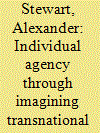

|
|
|
|
|
| Summary/Abstract |
This study examines subjective, social, and transnational aspects of conversion to Islam in modern China by examining the “conversion careers” (Gooren (J Sci Stud Relig 46(3):337–353, 2007), 2010) of seven “new Muslims” who reside in and around Xining, Qinghai Province. Examining their experiences that include pre-conversion socialization, initial encounters with Islam, study of the faith, conversion, and expressions of a new Muslim identity reveals a complex interaction between sociocultural circumstances and individual agency. Rather than gradually succumbing to local ideas of Islamic orthodoxy or passively obeying religious authorities, converts study Islamic texts, form a variety of interpretations, and express their newfound belief in various individual and collective ways that often conflict with social expectations, local Islamic norms, and moral authority of the Chinese state. Converts draw confidence to pursue these conversion careers by believing in the universality of their faith and imagining themselves as part of a transnational community that shares their interpretations of Islam. Thus, conversion to Islam can be seen as compatible with, or even the product of, modern trends of increasing rationality, individual agency, and transnational identity.
|
|
|
|
|
|
|
|
|
|
|
|
|
|
|
|
| 4 |
ID:
157956
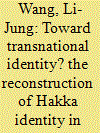

|
|
|
|
|
| Summary/Abstract |
The Hakka people (Hakkas) are a global cultural ethnic group. This article explored the experiences of the Hakkas in Thailand. One major ethnic minority in Thailand is the Chinese people (14 percent of the total population) who engage in businesses and commerce throughout the country. Fifty-six percent of the Chinese are Chaozhounese, and 16 percent are Hakkas. This article argued that the Thai-Hakka identity is a transnational construction mobilized by multiple agencies at the local, national, and global levels. This identity is a result of the negotiation from the common motherland (China) in the past, the new modern Hakka discourse and the multicultural policy (Taiwan), and the complex ethnic experiences and interactions in everyday life (Thailand). Compared to the traditional diaspora viewpoint (pluri-locally distributed, with a strong identity to the motherland), the Thai-Hakka identity has gravitated towards a new path of transnational identity (pluri-locally distributed, without a clear centre–periphery relation).
|
|
|
|
|
|
|
|
|
|
|
|
|
|
|
|
| 5 |
ID:
191867
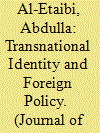

|
|
|
|
|
| Summary/Abstract |
The 2017 Gulf crisis has been largely framed as a diplomatic and economic one. However, the involvement of tribal identity in the foreign policy responses of Gulf states also made it a socio-political crisis. This paper adopts role identity theory as a framework for analysing how domestic politics and culture shaped international relations among GCC states during the crisis. According to this framework, tribal identity becomes operative in foreign policy when states can present themselves as fulfilling roles that distinguish them within a regional or international state system. Gulf states adopted new role identities defined in terms of tribe and tribal identity that then shaped the formulation and implementation of their diplomatic policies. During the crisis, Saudi Arabia adopted the role identity of tribe protector to undermine sovereign boundaries. The Qatari government on the other hand adopted the role of national unifier, rejecting tribal identity and ideologies. The implications of mobilising tribes are examined from the regime survival perspective, particularly scrutinising the gradual consolidation of the Qatari national identity to reduce risks posed to the regime.
|
|
|
|
|
|
|
|
|
|
|
|
|
|
|
|
|
|
|
|
|